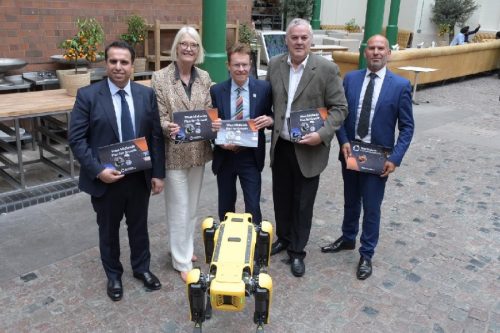Plan launched to boost region’s economy as scale of Covid impact revealed

A plan to boost the West Midlands economy and recapture its pre-pandemic success has been set out today as the true scale of the impact of Covid was made clear.
The West Midlands economy shrank by 11% in 2020 due, in part, to its large automotive sector and high number of exporting companies.
Despite having the highest level of Foreign Direct Investment outside London and a strong track record in getting people back into work, the regional economy was still 8% smaller at the end of last year than at the onset of Covid.
The figures are in stark contrast to the decade up to 2019, when the West Midlands was the fastest growing region outside London, breaking through the £100bn economic output mark.
In response to the figures, business and political leaders gathered at the Light House in Wolverhampton to discuss their plan for growth aimed at bringing about a resurgent West Midlands that is both confident and prosperous.
The roadmap, which has been drawn up by leading private sector figures working with the West Midlands Combined Authority (WMCA), local councils, universities and colleges, focuses action on igniting eight economic clusters where the region already has a competitive advantage and in which businesses are confident to invest.
It shows how, with the right interventions, growing clusters such as electric vehicle manufacture, health and medical technology and construction, can be supercharged to help grow the West Midlands economy by more than £3bn, creating up to 45,000 jobs.
The plan proposes combining the power of the private and public sectors around eight areas:
The manufacture of electric vehicles and battery storage devices
Modern and low carbon utilities such as solar and wind power technology
Logistics and distribution
The manufacture of the low carbon, factory-built homes of the future
Professional and financial services
Health and medical technology
Aerospace
Creative content production and video gaming
Andy Street, Mayor of the West Midlands and chair of the WMCA, said: “The West Midlands was very much the engine room driving a thriving UK economy pre pandemic but there’s no hiding the harsh impact Covid has had on us.
“Our natural strengths in exporting and manufacturing – particularly in automotive – have been hardest hit by recent challenges so it’s no surprise we have more economic ground to make up than many others as we regain our momentum.
“That’s why the private and public sectors have come together to set out a clear path for strong, clean and inclusive growth. Our focus is on driving investment to generate high value jobs and quality opportunities for local people that build on our traditional strong suits whilst looking to the growth sectors of the future.
“It must be a joint effort because while the public sector can use and is using its powers and funding to help lay the foundations for growth – think transport infrastructure, housing, urban regeneration and skills training – it will be the private sector that follows on with much greater investment and really drives delivery. Together, we will ensure we bounce back as a region.”
Paul Weston, regional head of logistics real estate provider Prologis UK, which is headquartered in Solihull, says the plan flags the critical partnerships needed to secure a growing economy that is both environmentally cleaner and fairer to communities and highlights the crucial role of the private sector, working alongside public authorities, in creating the right conditions for investment and prosperity.
He said that one of the main areas of focus is the logistics industry, which he says has “long been overlooked” by the Government despite having been the backbone of the UK’s economy – particularly over the COVID-19 pandemic.
Weston said: “The West Midlands Plan for Growth includes welcome recognition of the contribution the logistics industry makes to our economy and our way of life, particularly here in the Midlands.
“We wholly support the commitment of more brownfield land for commercial development – with Logistics rightly identified as a major investment opportunity for the West Midlands, which will bring economic benefits for many years to come including the creation of diverse jobs.
“From the largest of logistics companies and corporates such as Royal Mail, Sainsburys and Tesco, to the many thousands of retailers, e-commerce and 3PL businesses that distribute goods to our homes and businesses every day, demand for top-quality, sustainable logistics space has never been greater.
“At Prologis, our ethos as a logistics property developer is not just about creating large sheds in edge-of-town business parks but building well-equipped distribution spaces close to cities like Birmingham that are environmentally sustainable and great places to work.”








